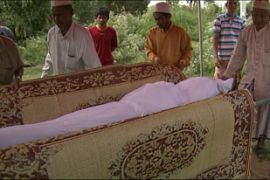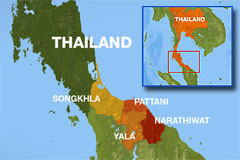Thai separatists to continue fight
No compromise in fight for self-rule in Muslim south, separatist group tells Al Jazeera.

Violence
Earlier this week two civilians were killed and a dozen people, including soldiers, were injured in the latest upsurge in violence in the region.
| IN VIDEO | ||
|
|
In one attack in Yala province on Tuesday a group of fighters stormed a food shop and killed the 24-year-old owner, while three of his relatives were wounded by gunfire, police said.
Elsewhere in the same province, a 41-year-old woman whom police said worked as a government informant was shot dead.
Despite some 30,000 Thai troops being deployed in the region, the shootings, grenade attacks and car bombings happen almost daily, with 90 per cent of those killed being civilians.
Muslims who work as teachers or in other positions seen as being too close to the government have also been targeted – in some recent cases the victims have been beheaded or burned alive, rights groups say.
“We have three kinds of enemies,” the senior BRN-C fighter told Al Jazeera.
“Siam and its allies – and another enemy who we don’t really know but they are people who obstruct our revolution. So we need to make them aware that as Muslims they should be on our side.”
‘Key to peace’
Another BRN-C field commander who admitted being responsible for many of the attacks over the last few years, told Al Jazeera that the group had cells in villages across the south that were so secretive even members did not know each others’ identities.
| Thailand’s troubled south |
|
Many complain of being treated as second-class citizens in mainly Buddhist Thailand The area was a semi-autonomous Islamic Malay sultanate until annexed by Thailand in 1902 Several violent uprisings have been put down by army over the century The latest uprising flared in January 2004 when fighters raided an army base, killing four soldiers. Some observers says that the violence was triggered after three years of tough policies on the south by Thaksin Shinawatra, the then premier Despite martial law imposed in 2004 and thousands of Thai troops in the region, near daily attacks blamed on Muslim fighters have left more than 3,700 people dead.In March 2009, the government of Abhisit Vejjajiva announced that 4,000 soldiers would be deployed to southern Thailand, supplementing more than 60,000 already stationed there. |
At a secret meeting in Narathiwat province he told our correspondent that the group was prepared to fight until its last breath to free Muslims from what he called the colonisation of the Thai south.
In an interview with Al Jazeera Thailand’s prime minister, Abhisit Vejjajiva, said his government was working to address “past injustices and grievances” as the way to move forward in the region.
“My government has made it a clear policy that the key to peace in the south is justice,” he said.
“It may be the aim [of the insurgency to demand a separate state], but my government will prove that the people living in the five provinces are treated fairly, that they will have opportunities, and that they are valued by the Thai government.”
But with little progress so far, support for the separatist movement has been growing.
The Thai army believes the BRN-C has 5,000 armed fighters and bomb-makers, along with some 50,000 supporters.
The group is believed to recruit mainly from madrassas or religious schools in the south, where opposition to Bangkok’s rule has been fuelled in recent years by the often harsh tactics employed by the Thai army.
“These provinces are all Muslim areas but they are under Thai rule, so what people are fighting for are their rights. Now they don’t have rights,” Ali Sekan, a religious teacher, told Al Jazeera.

